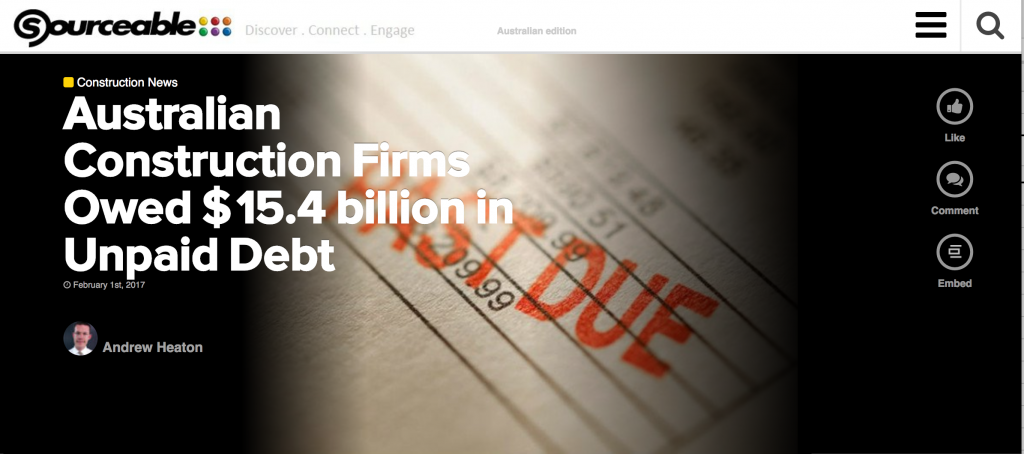And we Subcontractors wonder why we don't get paid on time, if at all.... Wonder no more....
https://sourceable.net/small-construction-business-owed-15-4-billion-unpaid-debt/
We subcontractors and suppliers fight a daily battle with our customers for cash flow, debtor payments are uppermost in our minds at all times. Will we be paid on time? Will we be paid at all? What can we sell or where can we get funds to continue to trade if the worst happens and we don't receive payment?
It affects our health, our family life and our relationships. It has to change and there is no time like now to change it while the Queensland Government is holding consultation sessions in various towns and cities. We have to roll up in numbers and put forward our ideas on how to make the building industry a commercially and financially safer place to work.
Story by Andrew Heaton - Sourceable.net
Small and medium sized construction businesses throughout Australia are ‘drowning in a sea of unpaid customer bills’ according to the latest report which found that small and medium businesses throughout the sector are owed a combined total of $15.4 million in unpaid debts.
Releasing its latest report, The Invoice Market said that on average, small to medium sized businesses are perpetually owed $44,812 each, with debtor excuses for non-payment ranging from ‘lost in the system’ to ‘being reviewed internally’ to being ‘in dispute’ or being ‘processed off-shore’.
According to the report:
- 48 percent of builders have no strategy in place to manage their company cashflow.
- On average, 50 percent of builders have had to ask two or three times for their bills to be paid by errant corporate customers.
- 30 percent of all builders are owed more than $500,000 whilst 11 percent have more than 20 invoices owed to them.
- 80 percent of businesses who owe builders money are small to medium sized enterprises, with only 20 percent being large or multi-national businesses.
- Cash flow throughout the construction chain appears to be tight, with 36 percent of customers having sought to extent credit terms over the past twelve months.
In its report, Invoice Market says cash flow problems associated with having money tied up with debtors is impacting the ability of small and medium sized builders to meet their cost of housing and other living expenses and pay their own workers and is eroding confidence to invest and hire more staff.
The latest data follows ongoing concern about the level of insolvency with the building sector throughout Australia.
A Senate Inquiry into construction industry in 2015 talked of a ‘culture of non-payments’ throughout the industry.
Commenting on the report, Kurt Hegetschweiler, founder of construction industry business coaching company Builders Coach, said he was not seeing quite the level of cashflow difficulty on the ground as is outlined in the report, although he cautions that this may be partially because those who use his services tend to be amongst the more proactive of the builders in terms of efforts to manage their cashflow.
Nevertheless, he says cash flow is a consistent challenge for all builders.
“With every single one of the guys who come to me, cash flow is front-of-mind all the time,” Hegetschweiler said. Even if they have got a handle on it now, they have got to constantly work at reining it in, constantly work at getting better payment schedules, making sure that they have got good agreements with their suppliers, good terms with their trades and structure their business to cherry pick the right clients and make sure they don’t bring that toxic client in because one bad client can cost them a lot of money.
Speaking of ABS data referred to in the report which suggests that 47 percent of all construction businesses go out of business within the first three years of operation, Hegetschweiler said this is concerning.
“That’s astounding, it’s shocking, and I think the general public need to be educated on how important it is. Not only the general public, but also builders as well.”


